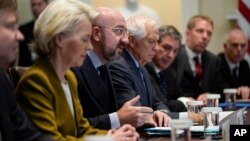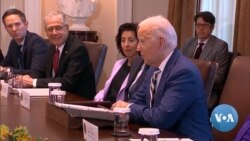The Israel-Hamas war and efforts to ensure continued support for Ukraine dominated the Friday summit between U.S. President Joe Biden, European Commission chief Ursula von der Leyen, and European Council President Charles Michel, dimming prospects to resolve long-running disputes between the United States and European Union over Trump-era tariffs on steel and aluminum and U.S. green subsidies.
"We stood together to support the brave people of Ukraine in the face of Putin aggression. And we stood together to tackle economic challenges, established standards to guide our relationship with China, and we're standing together now to support Israel in the wake of Hamas' appalling terrorist attack,” said Biden as he welcomed his transatlantic partners at the White House for the second U.S.-EU Summit since he took office.
Michel pledged the EU and U.S. will forge “a united front to tackle all these challenges head on.” That sentiment was echoed by von der Leyen who underscored that the “conflicts show democracies must stand together,” and that the war in Gaza will not distract from “rock solid support” to Ukraine.
“Putin will ultimately fail,” she said, outlining the close to $90 billion European assistance to Ukraine and plans to provide another 50 billion euro.
Sharing Washington's anxiety that the West might be dragged into a wider war in the Middle East, von der Leyen said she is “particularly concerned” about Iran and its proxies, militant groups in the region including Houthis in Yemen whose cruise missiles and drones launched towards Israel were intercepted by a U.S. warship in the North Sea Thursday.
“No one should take advantage of this situation,” she warned.
Both Michel and von der Leyen underscored that Israel's right to defend itself must be done in line with international humanitarian law.
“We stand with Israel and against terror. At the same time, Palestinians also suffer from Hamas terroristic actions,” she said, reiterating that the militant group does not represent the Palestinian people and underscoring efforts to increase humanitarian aid to civilians in Gaza.
Still watching other parts of world
In addition to brewing wars in Ukraine and Gaza, the transatlantic partners aim to curb Chinese growing power, keep Iran and North Korea in check, and improve ties to the Global South.
Geopolitical conflicts are distracting from the trade, climate and technology agenda that the leaders must deal with, said Ian Lesser, executive director of the Brussels office of the German Marshall Funds who leads the organization's work on transatlantic relations.
“Given what's going on in the world and also given the EU's ambitions to play a larger geopolitical role — that's especially important to Commission President von der Leyen, it's not surprising that geopolitics will be at the top,” Lesser told VOA.
Trade talks focus on tariffs, subsidies
Irritants on trade remain, centered around two main issues of transatlantic contention: tariff disputes on steel and aluminum, and U.S. green energy subsidies.
Despite intense negotiations, the U.S. and European Union failed to reach an accord on tariffs on EU steel and aluminum imports — 25% and 10%, respectively — imposed under former U.S. President Donald Trump.
Biden suspended the tariffs during his first U.S.-EU summit in June 2021 on the condition that Brussels apply similar tariffs to Beijing, charging that China is subsidizing its companies to flood the market with cheap metal. The EU says it has to follow World Trade Organization rules and first conclude its year-long investigation.
This two-year suspension of steel and aluminum tariffs is set to expire on October 31, but negotiators are now aiming for a deal by the end of the year, called the “Global Agreement on Sustainable Steel and Aluminum.”
The deal is essentially a joint tariff zone between countries that agree on shared environmental standards and limits on government subsidies and overproduction. If agreed, it will impose duties on steel and aluminum imports from non-market economies including China.
Another issue is the $370 billion subsidy for U.S. companies provided under Biden's climate and clean energy bill called the Inflation Reduction Act. The act provides consumers with tax breaks to buy electric vehicles assembled in North America. EU negotiators are attempting a deal that would allow EVs with batteries using critical minerals — cobalt, graphite, lithium, manganese and nickel — sourced from Europe to qualify for some of the IRA's consumer tax breaks.
According to the White House, U.S. and EU will also continue cooperation in critical and emerging technologies, including on digital infrastructure and artificial intelligence.






